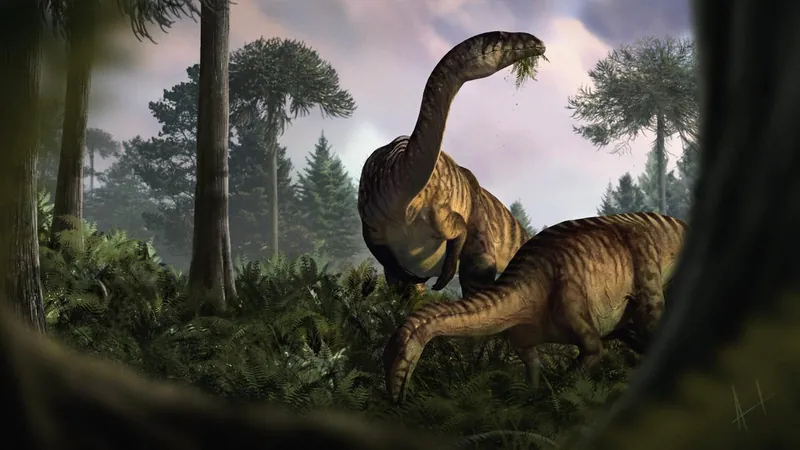
Unearthing the Past: Fossilized Poop Sheds Light on Dinosaur Dominance Over 200 Million Years Ago
2024-12-01
Author: Jacob
Introduction
In a groundbreaking study published in the journal *Nature*, researchers have unveiled significant insights into the rise of dinosaurs, revealing that their success can be attributed to one fascinating factor: fossilized poop.
Research Overview
Paleontologists from the University of Uppsala in Sweden conducted an extensive examination of over 500 fecal remains, known as bromalites, which include coprolites (fossilized droppings) and regurgitalites (fossilized vomit). This research focuses on some of the earliest dinosaurs, demonstrating how their varied diets enabled them to flourish over 200 million years ago.
Timeframe of Dominance
During the Late Triassic to early Jurassic periods, approximately 230-200 million years ago, dinosaurs transitioned from being one of many reptilian species to the dominant life forms on Earth. To understand this evolutionary leap, co-authors Martin Qvarnström and Grzegorz Niedźwiedzki analyzed these ancient droppings, which were meticulously collected from the Polish Basin over a span of 25 years.
Methodology
Utilizing advanced techniques such as 3D imaging, they explored the internal structures of these fossilized specimens to uncover what these early dinosaurs were consuming.
Insights from the Study
"Our study shows that seemingly unremarkable fossils can yield remarkable insights," Qvarnström stated. The findings revealed a diverse diet that included bits of fish, insects, plants, and other animals. Notably, some coprolites contained well-preserved beetles and partially eaten fish, while others featured fragments of crushed bones.
Food Web Construction
By analyzing these samples, researchers constructed food webs that depicted the dietary habits and evolution of emerging dinosaur species. This data allowed them to compare the dinosaurs' dietary patterns with the fossil record and prevailing climate data, indicating that these creatures were far from picky eaters.
Environmental Adaptability
As Earth underwent dramatic climatic shifts during this era, the adaptability of these early dinosaurs played a crucial role in their survival and proliferation. "Studying past ecosystems provides critical insights into how life adapts and thrives during periods of environmental change," Qvarnström emphasized.
Implications and Future Research
This research not only illuminates the dietary flexibility of dinosaurs but also opens doors for future studies on how ancient species responded to changing ecosystems. The revelations drawn from fossilized poop could change our understanding of evolutionary biology and the resilience of life on Earth.
Conclusion
Could the key to understanding our planet's past be found in an overlooked source? Only time will tell as scientists delve deeper into the narratives written in fossilized remains. Stay tuned for more discoveries that may reshape our comprehension of prehistoric life!









 Brasil (PT)
Brasil (PT)
 Canada (EN)
Canada (EN)
 Chile (ES)
Chile (ES)
 España (ES)
España (ES)
 France (FR)
France (FR)
 Hong Kong (EN)
Hong Kong (EN)
 Italia (IT)
Italia (IT)
 日本 (JA)
日本 (JA)
 Magyarország (HU)
Magyarország (HU)
 Norge (NO)
Norge (NO)
 Polska (PL)
Polska (PL)
 Schweiz (DE)
Schweiz (DE)
 Singapore (EN)
Singapore (EN)
 Sverige (SV)
Sverige (SV)
 Suomi (FI)
Suomi (FI)
 Türkiye (TR)
Türkiye (TR)